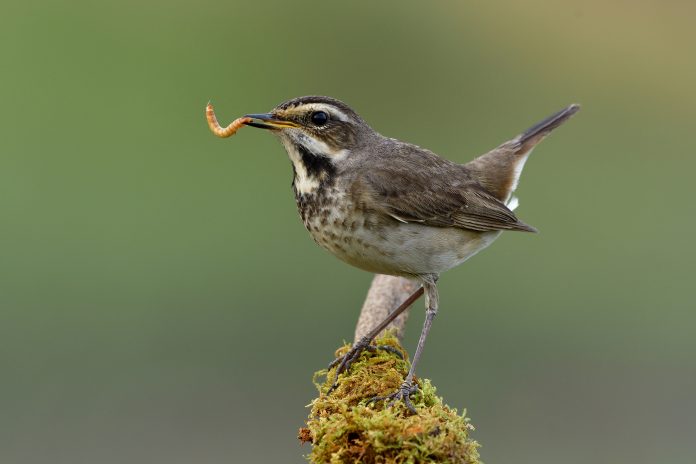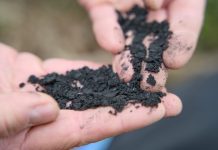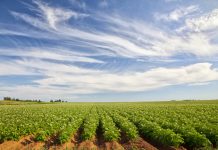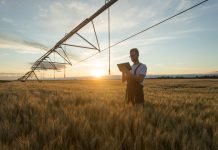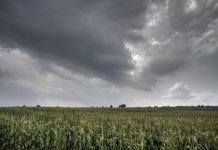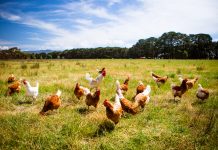Teun Veldkamp, Coordinator of the Sustainable Insect Chain (SUSINCHAIN) project reveals how it aims to enable large scale insect production and consumption in Europe
Teun Veldkamp, Coordinator of the Sustainable Insect Chain (SUSINCHAIN) project highlights in this article the main objectives of the project and the activities by the 35 participants (18 industry and 17 academic partners) in the multidisciplinary consortium.
The Food and Agriculture Organization (FAO) estimated that feeding a world population of 9.1 billion in 2050 would require raising overall food production by 60% from 2005/2007 to 2050. Effectively achieving such fundamental changes requires an economy based on the principle of circularity and that considers resource limitations.
To help European business and consumers to make the transition to a stronger and more circular economy, the European Commission (EC) adopted an ambitious new Circular Economy Package in 2017, calling for closing loops in product lifecycles. The package also includes an Action Plan to support the circular economy in each step of the value chain.
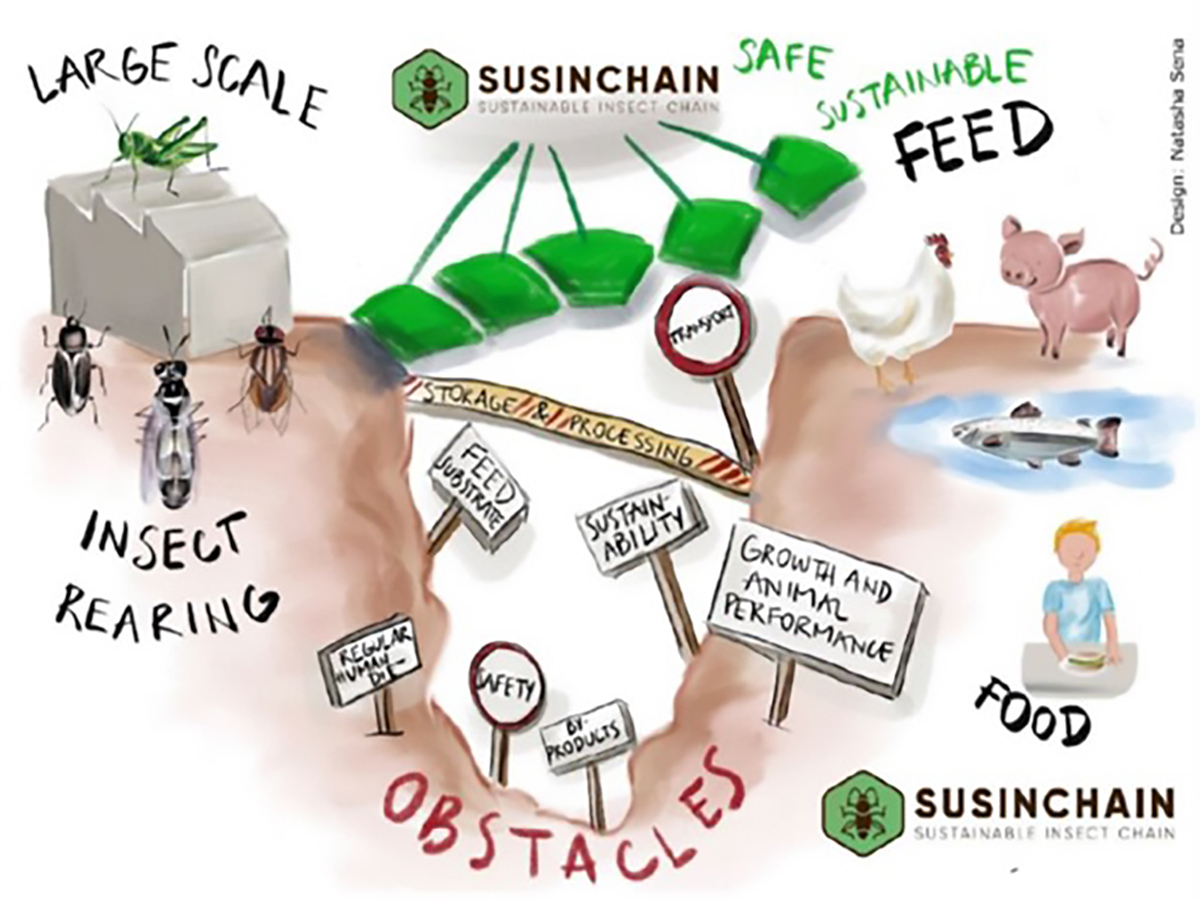
Insects are one of the most promising alternative sources of protein available in Europe to enter the feed and food market. Insects have a high potential for efficient upgrading side streams of food production and contain high quality protein and essential nutrients. To contribute to the circular economy foreseen by the EC, this potential urgently needs to be strengthened and upscaled, in order to ensure more sustainable, resilient supply chains with high consumer acceptability and attractive market opportunities.
The insect sector for feed and food is relatively new in Europe, dominated by SMEs facing many hurdles and challenges in scaling up. A few, large-scale rearing companies exist, mostly in Western European countries, and often with outside investments. As a result, there is currently a mismatch (or gap) between demand in quantity and quality of insect products and supply available from insect chain actors.
Currently, the cost price of insect (protein) products is not competitive against e.g. soybean meal (feed) and minced meat (food). Among the alternative proteins, however, insects are becoming increasingly more cost-effective now being only a few steps away from large-scale use in the feed and food market in Europe. SUSINCHAIN contributes to removing the mismatch between demand and supply and decreasing the cost price of insect products by sharing knowledge and collecting data, as well as testing, piloting and demonstrating newly developed innovations in the insect chain and increasing societal engagement.
Project focuses
SUSINCHAIN focuses on the most promising insect species for feed and food production in Europe (black soldier fly, housefly, mealworm and house cricket) considering production, processing and use as feed and food. SUSINCHAIN tackles the following hurdles for up scaling (picture 1):
- Markets for insect products: SUSINCHAIN analyses strategies to overcome identified supply- and de-mand-side barriers for large-scale commercialisation of high-quality insect proteins. Practical experience of consortium industry partners and stakeholders in addressing supply-side barriers as well as related risk management strategies are evaluated, and best practices are elaborated on this basis. Best practices from insect farmers are identified and shared in two living labs. Successful strategies for gaining trust and consumer acceptance of food and feed products derived from insect proteins are established as a precondition for large-scale commercialisation of insect- based food products.
- Insect rearing: SUSINCHAIN focuses, for environmental and economically sustainability reasons, on conversion of low-grade left-overs or organic side streams, that cannot be fed directly to animals, into high-grade insect proteins and their (direct) use as human food or (indirect) in animal feed will close the loop in the circular economy and increase the sustainability of the food chain. For improving economic viability, possibilities for marketing of rearing by-products and prevention of insect diseases are tested.
- Processing of insects: SUSINCHAIN is optimising and demonstrating large-scale implementation of promising transport, storage and processing technologies for insects. Microwave and Radio Frequency drying, High Moisture Extrusion and protein recovery from fresh larvae by using enzymatic pre-treatment combined with continuous tricanter centrifugation are validated and demonstrated in the insect value chain. Storing and transporting methods are also tested while keeping their quality at large-scale volumes. To reach maximal recovery and viability, controlled atmosphere packaging and cold atmosphere preservation for storage and transport of living insects are assessed.
- Use of insects in feed: SUSINCHAIN assesses digestibility of insect protein meals produced by different processing methods. Moreover, the project performs large scale trials feeding animals commercial diets containing different levels of insect meal. Optimal inclusion levels of insect protein will be determined relative to a diet with conventional protein sources, to maintain or increase performance and health of rainbow trout, sea bass, salmon, broilers, laying hens and piglets.
- Use of insects in food: SUSINCHAIN designed and developed insect-based food products (mealworm and house cricket) suitable for the domestic preparation of regular dinner meals in European households. The products are sensory evaluated and will be assessed in consumer studies aiming for 20% replacement of protein from meat in weekly menus.
- Safety of insect production: SUSINCHAIN ensures safety of insects and derived products along the entire chain. The microbiological, chemical and allergenic safety of insects reared on a variety of non-conventional plant-based substrates is tested. Also, all optimal transport and processing techniques are monitored for microbiological safety and allergenicity of the insect products.
- Sustainability of insect chains: SUSINCHAIN develops a decision support system to ensure the growth of the insect value chain in Europe is sustainable. To this end, requirements to reach positive environmental effects without diminishing the potential for economic profitability when using insects as feed and food will be identified.
SUSINCHAIN website and stakeholder platform
More information on the project is available on the website https://susinchain.eu/.
You are also invited to join the Stakeholder Platform. Members will be able to join available groups, post information and start conversations among themselves. The stakeholder platform is restricted to invitation only – please contact us if you would like to join the platform.
Acknowledgement
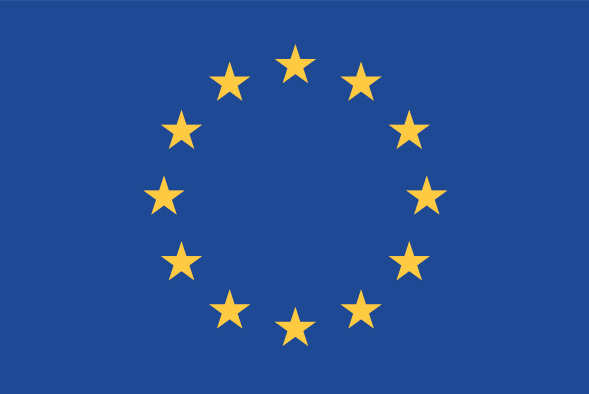
This project has received funding from the European Union’s Horizon 2020 research and innovation programme under grant agreement nº 861976.
This document reflects only the author’s view and the Commission is not responsible for any use that may be made of the information it contains.
Please note: This is a commercial profile
© 2019. This work is licensed under CC-BY-NC-ND.

